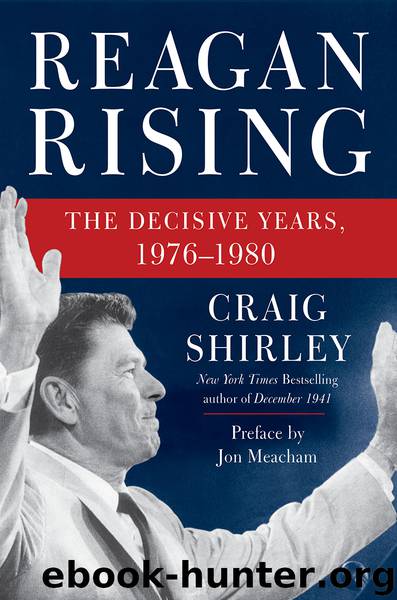Reagan Rising by Craig Shirley

Author:Craig Shirley
Language: eng
Format: epub
Publisher: HarperCollins
Published: 2017-03-20T16:00:00+00:00
10
“Big John” Versus “Poppy”
“There was a haziness about exactly where he stood politically.”
In the three years since John Connally was skipped over by Gerald Ford to be his vice-presidential running mate, little had changed as to how the political world viewed “Big John.” No one in American politics was without an opinion about the outsize Texan. Opportunist, smart, cunning, crass, mean, tough, and most especially wheeler-dealer—all these words had been applied to Connally over the course of his political career.
A partial survey of the 1976 GOP delegates in Kansas City had shown an enormous preference for the Texan for veep: at 224 to 97 for Ronald Reagan and to 93 for Senator Howard Baker.1 It was only a small group of the more than 2,000 delegates to the convention, but it was a sign of Reagan’s weakness and of resistance on the part of the GOP to the Californian. Connally was eventually passed over in favor of Bob Dole, and the humiliation was more than the proud Texan could bear. Ford had ruled out Connally and all that he brought to the table, including a federal indictment (for which he was found innocent), a larger-than-life ego, the Lyndon Johnson association, and a real fear that he might simply overshadow Ford.
Connally could throw mud with the best of them. In 1960, at the Democratic National Convention, while helping his friend Lyndon Johnson try to wreck the near nomination of John Kennedy, Big John spread rumors about JFK’s physical infirmities, “suggesting that John Kennedy suffered from Addison’s disease.”2
That there was intense jockeying among the growing number of prospective would-be GOP presidential suitors was not surprising. By the fall of 1979, most everybody had bought into the well-founded notion that Gerald Ford was perfectly happy raking in the big bucks from the many corporate boards he served on, his lectures, and the endless stream of invitations to play golf at the best and most exclusive clubs with no waiting for a tee time. A rationale for a Connally candidacy was emerging.
* * *
Gerald Ford’s fires of anger at Reagan over 1976 had been banked only a tad by 1979, and he often carped about the primary challenge.3 Where it was once assumed he would head a “Stop Reagan” effort, practicality and cooler heads prevailed, as Ford realized that if he were to accept the nomination of a brokered convention in 1980, he would need Reagan’s support.
As far as Reagan was concerned, he was the nominal front-runner, but for all of 1979, neither hide nor hair could be found of him, and more and more were convinced that he had a glass jaw that would shatter. Among the feisty competition in the field the one in second place would benefit from Reagan’s demise. “It was assumed that he was too old, too blunder-prone, simply too improbable,” wrote Elizabeth Drew. “Another assumption [is] that if Reagan is the Republican nominee the election of a Democrat is certain.”4 Drew was a well-respected political observer, and her writings and pronouncements spoke for many and were read by all.
Download
This site does not store any files on its server. We only index and link to content provided by other sites. Please contact the content providers to delete copyright contents if any and email us, we'll remove relevant links or contents immediately.
| American Revolution | Civil War |
| US Presidents |
Fanny Burney by Claire Harman(26591)
Empire of the Sikhs by Patwant Singh(23066)
Out of India by Michael Foss(16841)
Leonardo da Vinci by Walter Isaacson(13304)
Small Great Things by Jodi Picoult(7112)
The Six Wives Of Henry VIII (WOMEN IN HISTORY) by Fraser Antonia(5493)
The Wind in My Hair by Masih Alinejad(5085)
A Higher Loyalty: Truth, Lies, and Leadership by James Comey(4945)
The Crown by Robert Lacey(4801)
The Lonely City by Olivia Laing(4796)
Millionaire: The Philanderer, Gambler, and Duelist Who Invented Modern Finance by Janet Gleeson(4457)
The Iron Duke by The Iron Duke(4345)
Papillon (English) by Henri Charrière(4251)
Sticky Fingers by Joe Hagan(4183)
Joan of Arc by Mary Gordon(4091)
Alive: The Story of the Andes Survivors by Piers Paul Read(4017)
Stalin by Stephen Kotkin(3953)
Aleister Crowley: The Biography by Tobias Churton(3626)
Ants Among Elephants by Sujatha Gidla(3458)
